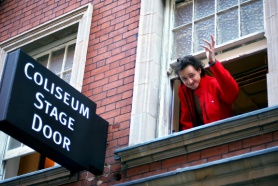22-28 July 2008, London, UK
London tour
On July 27, 2008, the Mikhailovsky Ballet made a triumphal ending of the first ever London Tour, which took place at the London Coliseum.
The season started with a real sensation — Spartacus by Aram Khachaturian choreographed by George Kovtun. The Coliseum was a perfect place to feature the gladiator saga. The public was amazed with the show. ‘Denis Matvienko is terrific as Spartacus, a fearless freedom-fighter with a true heart and a bold heroic sweep to his dancing that energises the entire evening and makes sense of the nonsense. As Crassus, Marat Shemiunov exudes patrician vanity, though his acting is hopelessly melodramatic. Irina Perren is given short shrift as Spartacus’s beloved Valeria but still shines tenderly. And Anastasia Matvienko has the most fun as Crassus’s courtesan girlfriend, shooting her legs into the air in a fabulous display of hussy extensions’, Debra Craine resumed in The Times.
The critics both saw it as an unexpected alternative to the usual tours of The Bolshoi and Kirov Ballet and a production that was worth of every penny spent on it. ‘It’s easy to see why Spartacus was chosen to open the company’s first UK visit: as exotic spectacle, it shows the Mikhailovsky’s new ambition’, Zoe Anderson explained her readers in The Independent.
The more startling Spartacus seemed, the more surprising Giselle appeared. ‘The season’s other repertory offering was a new staging of Giselle made by Nikita Dolgushin, in his time a noble and ‘intellectual’ Albrecht. I like this version in its traditional and well-reasoned design by Vyacheslav Okunev. It is unfussed, the drama cleanly plotted with an absence of narrative flummery’, Clement Crisp commented on the production in The Financial Times.
‘Denis Matvienko and Anastasya Matvienko (the husband-and-wife stars of the company) brought plenty of beautiful dancing to their leading roles, if not quite the soulful dramatic exposition one hoped for. His Count Albrecht was sensitive but not wholly honourable, which is right (his betrayal is what sends Giselle to her death), and his dancing in Act II brought forth an immaculate display of refined and robust classical technique. Anastasya Matvienko’s Giselle was delivered with a lustrous sheen, impressive technical control and a creditable transformation from innocent peasant girl to tragic wraith. Their performances were complemented by a fine corps de ballet of Wilis, well attuned to the dramatic purpose of Adam’s music’, Debra Craine commented in The Times.
The finale of the London Tour was the Triple Bill, which included the Grand Pas from Paquita, The Cavalry Halt choreographed by Marius Petipa (‘cocky mix of classical ballet, character dancing and pantomime, with the flirtatious and the foppish sitting side by side in the trifling romantic escapades’) and dazzling divertissements.
Finally, the main idea of the season was formulated by Debra Crain in The Times: ‘If you really wanted to get the measure of the Mikhailovsky Ballet, it was the end of the St Petersburg company’s London debut season that provided the answers. Between a well-drilled Giselle and a glittering mixed bill it was possible to appreciate a company of far greater depth and subtlety than the opening Spartacus would suggest’.
London tour 2008 website
The season started with a real sensation — Spartacus by Aram Khachaturian choreographed by George Kovtun. The Coliseum was a perfect place to feature the gladiator saga. The public was amazed with the show. ‘Denis Matvienko is terrific as Spartacus, a fearless freedom-fighter with a true heart and a bold heroic sweep to his dancing that energises the entire evening and makes sense of the nonsense. As Crassus, Marat Shemiunov exudes patrician vanity, though his acting is hopelessly melodramatic. Irina Perren is given short shrift as Spartacus’s beloved Valeria but still shines tenderly. And Anastasia Matvienko has the most fun as Crassus’s courtesan girlfriend, shooting her legs into the air in a fabulous display of hussy extensions’, Debra Craine resumed in The Times.
The critics both saw it as an unexpected alternative to the usual tours of The Bolshoi and Kirov Ballet and a production that was worth of every penny spent on it. ‘It’s easy to see why Spartacus was chosen to open the company’s first UK visit: as exotic spectacle, it shows the Mikhailovsky’s new ambition’, Zoe Anderson explained her readers in The Independent.
The more startling Spartacus seemed, the more surprising Giselle appeared. ‘The season’s other repertory offering was a new staging of Giselle made by Nikita Dolgushin, in his time a noble and ‘intellectual’ Albrecht. I like this version in its traditional and well-reasoned design by Vyacheslav Okunev. It is unfussed, the drama cleanly plotted with an absence of narrative flummery’, Clement Crisp commented on the production in The Financial Times.
‘Denis Matvienko and Anastasya Matvienko (the husband-and-wife stars of the company) brought plenty of beautiful dancing to their leading roles, if not quite the soulful dramatic exposition one hoped for. His Count Albrecht was sensitive but not wholly honourable, which is right (his betrayal is what sends Giselle to her death), and his dancing in Act II brought forth an immaculate display of refined and robust classical technique. Anastasya Matvienko’s Giselle was delivered with a lustrous sheen, impressive technical control and a creditable transformation from innocent peasant girl to tragic wraith. Their performances were complemented by a fine corps de ballet of Wilis, well attuned to the dramatic purpose of Adam’s music’, Debra Craine commented in The Times.
The finale of the London Tour was the Triple Bill, which included the Grand Pas from Paquita, The Cavalry Halt choreographed by Marius Petipa (‘cocky mix of classical ballet, character dancing and pantomime, with the flirtatious and the foppish sitting side by side in the trifling romantic escapades’) and dazzling divertissements.
Finally, the main idea of the season was formulated by Debra Crain in The Times: ‘If you really wanted to get the measure of the Mikhailovsky Ballet, it was the end of the St Petersburg company’s London debut season that provided the answers. Between a well-drilled Giselle and a glittering mixed bill it was possible to appreciate a company of far greater depth and subtlety than the opening Spartacus would suggest’.
London tour 2008 website



